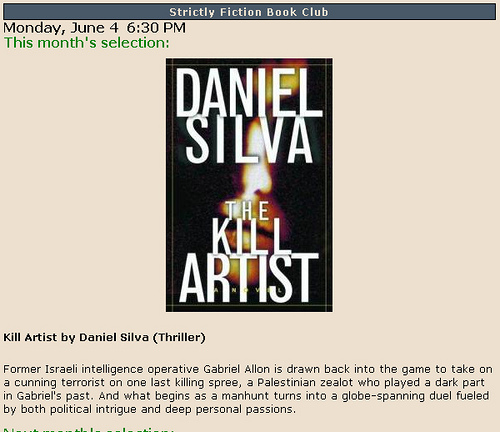
There’s a bit of a dilemma brewing in my brain. Let me unpack it for you.
I’m an avid reader: a non-fiction guy. Philosophy, pragmatic thought and ethics. Religion, mysticism, law and queer Torah studies. Politics and liberal theory. History (the American Civil War). Economics, finance and banking. On average, I read anywhere from 25 to 40 full-sized articles (read: 500 to 1500 words) a day, in addition to 50 to 100 pages in one or several books. My shelves are over-filled, and my sitting room wall is covered by un-shelved stacks. I’m not “into” fiction. From time to time, I’ll leisurely read a novel, but I’ve found these days most can’t hold my attention. And at the rate I read, I need to get hooked fast, or I’ll likely give up. Still, between the bulk of other materials I delve into, I keep trying to find a winner.
Over the weekend, I bought one of Daniel Silva’s thrillers on a whim.
If you don’t know SIlva, he’s a Jewish novelist and former CNN journalist who specializes in the kind of quick-read thrillers you can find at the grocery store. Silva has been very financially successful in plying his trade. His usual protagonist is Gabriel Allon, a former Israeli assassin and professional art restorer who keeps getting pulled back into “the game.” Silva’s villains are broad, James Bond-type caricatures: terrorists with dark secrets, heartless assassins who show no mercy, etc. The Israeli-Palestinian conflict often serves as the background for Silva’s work, even if the novels’ tone feels more like a hyper-violent comic book than a legitimate political read.
Here’s the thing. Over the weekend, I made it through the Silva book in no time. Try as I might to put it down, I simply couldn’t. And god help me, I feel more than a little guilty for it.
Politically, I’m left of center. As a member of my local synagogue (Reform), I’m left of left. I am generally more intrigued by Jewish Voice for Peace than AIPAC. As a bisexual Jew, I am wary of “defaulting” toward traditional gender roles: “masculine” men and “feminine” women and all the messiness of those categories. As a pacifist, I deplore violence. If I were to meet any of Silva’s protagonists in person, I’d be hard pressed to “play nice” to their one-note politics. Furthermore, Silva’s popularity with those in conservative talk radio circles (from Glenn Beck to Hugh Hewitt) is, in a word, icky. But damn. These books are like crack cocaine.
What does this mean to me? As fiction, as some kind of cathartic “vacation” from my usual heavy reading — with clearly defined, cartoonish heroes and villains — Silva’s work is undeniably entertaining. Were his work to be made into a film, it would play something like the Bourne films, or Skyfall. Nothing wrong with that. What’s troubling is that, for many, these kinds of political paperbacks play to dangerous tropes, especially around the relationship between Arabs and the Western World, the Israeli-Palestinian conflict, the “War on Terror,” the Obama Administration, and so on.
And by shilling out my cash for fiction like this, I fear I somehow “endorse,” however unintentionally, a very real political system whose actual values on real issues I critique daily. I’m not entirely sure what this means. While I don’t intend to avoid Silva’s work in the future — far from it, I intend to get the next book in the Allon series for a flight I’m taking this week — I feel torn between the real world, and my own capacity for disbelief suspension. As fiction, SIlva is harmless. As a platform for subtle political discourse, the situation becomes more complicated.
Here’s the question I pose to you: do you ever find your perceived views of an author’s work to be detrimental to your ability to enjoy that book? Why, or why not? Share in the comments.

